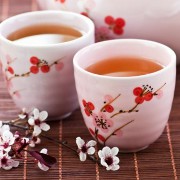 Photo: Getty Images
Photo: Getty Images
Green tea has long been proclaimed as the best type of tea for health benefits due to its high concentration of antioxidants and its low levels of caffeine. But if you are looking for the best of the best, white tea may be an even better choice.
Green tea contains high concentrations of antioxidants known as phenols. These same antioxidants are also found in berries and grapes. Antioxidants work in the body to prevent cumulative damage from a process known as oxidation. Oxidation is a normal process in the body that damages cells and is believed to be the cause of aging and death. During oxidation, charged particles called free radicals steal electrons from nearby cells. This damages the cells by causing small changes in the DNA which prevents them from functioning the way they are supposed to. Antioxidants offer up their electrons to free radicals which prevents damage to tissue cells. Each antioxidant molecule can only give up one electron to a free radical. So a fresh supply of antioxidants is constantly needed to prevent cell damage.
By comparison, white tea contains the same antioxidants as green tea but in even higher concentrations. At the same time, white tea contains lower levels of caffeine than green tea. Both green and white tea (along with black and oolong teas) are made from the Camellia sinensis plant. The difference is found in the method used to prepare the tea leaves for use.
• Black: Black tea, which has the strongest flavor, highest caffeine levels, and lowest antioxidant concentration, is made by fully oxidizing the leaves. This is done by rolling or crushing the leaves to release the essential oils, then heating and drying the tea.
• Green: Green tea is not oxidized. For Japanese green tea, the leaves are steamed. Chinese green tea is processed using dry heat.
• White: White tea receives the least processing. Unopened tea buds are picked when they are so young that they still have fine white “hairs” on the surface. These buds are gently processed through air-drying, sun-drying, or oven-drying. Because the buds must be picked at a young age, white tea is rarer than other types of tea and is therefore more expensive.
Another difference between these types of tea is the style of brewing. White tea is considered to have the lowest caffeine, and it does if it is brewed as recommended using water that is lower in temperature (below boiling) and for a short brew time. However, if white tea is brewed using boiling water and steeped for a longer time, it can actually have more caffeine than black tea.
Green tea is sometimes used to treat certain cancers including breast, stomach, and skin cancers. Some studies show it can slow the growth of cancer cells, but results of these studies are mixed. Green tea is also believed to improve mental alertness, possibly because it contains caffeine. White tea is also being tested for the treatment or prevention of certain cancers, including lung cancer.
Sources:
About.com: Antioxidants
About.com: White Tea
About.com: Tea Types
National Center for Complementary and Alternative Medicine






Add a Comment1 Comments
I have many friends who are pregnant and they wonder if it is safe to drink green and white teas when pregnant. Should these be treated with the same caution you would other teas, or are they considered more safe? did you see anything about that in your research?
February 24, 2011 - 9:32amVery interesting article. I've seen white teas advertised, I've even tried it, and wondered what the difference is.
Thanks for this education and enlightening post.
-Christine
This Comment